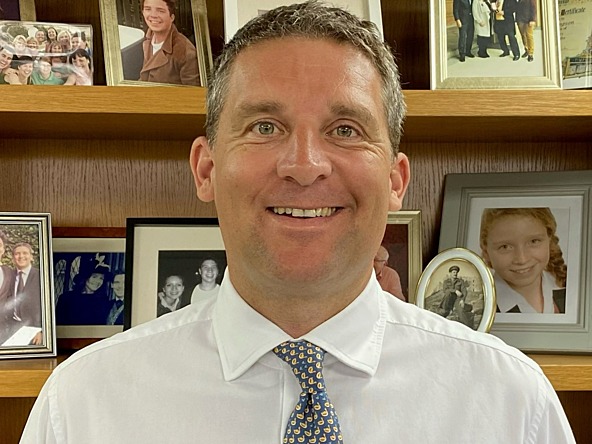The power of keeping it simple

Interviewed by Louise McLaren, managing director of Love Brands, at the MRS Impact conference 2022, Timpson (pictured) said that his company constantly receives pitches for new merchandise ideas.
“We get pitched ideas all the time and I’m always wary. It takes away from our roots and our culture and the simplicity of our business model. We'll have someone coming to us, wanting to sell a product, and they always say [something like], ‘If you sell our products, you’ll make a million pounds profit’. But what they don't understand is how it creates a lack of purity in what we're trying to do, it’s just more complexity.
“We make money out of being very, very simple and not being a complex business at all. Lots of times it’s been pretty miserable, saying no when people have what they think are really good ideas, and they are actually good ideas, but they’re not right for us.”
Asked by McLaren what products would make the grade, he replied: “The thing that we’re good at is high-margin services that you can't do on the internet. We're not really a merchandise business, so we avoid it; I don't want to sell anything that’s promoting anybody else’s brand rather than our own.
“Also, I don't want to choose anything that our colleagues don’t like. If our colleagues like it and it’s something that appeals to them, then they will make it work. If it’s something I'm forcing on them, they will just bury it. If it has a high margin, keeps pushing our brand and our colleagues like it, then we’ll probably make a go of it.”
The Timpson Group chief executive spoke candidly when he said that, in theory, with high street shops vanishing so rapidly, his business shouldn’t really exist any more. “All of our competitors are virtually gone. If you look around, there’s only a handful of multiple shoe repair chains and photo stores still in existence.
"But we’ve managed to keep going by having this sort of desire to survive, by being really good at what we do and making sure that we fill the business with amazing people and let them get on with it.”
He related why he believes the company has managed to sustain its competitive edge over such a long period of time. “I think being a private family business has made a big difference because we’ve never had the ambition to try and sell the company and we’ve tried to run it very conservatively. It’s [down to] a number of factors, but essentially we've managed to survive by doing things differently.”
He attributed part of the company’s success to the fact that he actively enjoys and embraces change. “I like testing things all the time in our shops and trying new ideas with colleagues. We sort of celebrate failure and we say, ‘This might not be right’, but then we get something that does work and we put our foot down and try and get it everywhere as fast as possible, that’s our strategy.”
Timpson explained that the culture of the business revolves around what they call “upside down management”, giving employees the authority to do whatever they think is right in order to provide customers with the best service. He gave the example of designing new staff uniforms.
“I launched a month-long consultation with a WhatsApp video to let people know we were going to redesign the uniforms and asked them to think about it. Then, in a month’s time, I got them to send in all their design ideas.
“I have 10 colleagues who really know what they’re talking about [in terms of design] and would be good at it. So we’ll get them all together and we’ll work out what the things are that everybody wants that’s going to offend the least number of people.”
Although he is a big advocate of consultation, he pointed out that it does not extend to all parts of the business. “There are other things that I don't consult anybody on at all: which shops to open, capital expenditure and strategy, those are the three things that I do not delegate.”
Timpson is also known as the chair of the Prison Reform Trust and employs over 600 ex-offenders, a figure that equates to more than 10% of the company’s staff. He elaborated on how it came about: “I was invited to a local prison to have a look around and I was fascinated because my mother used to foster children and a lot of them had mums who were in prison.
"Also, I went to boarding schools and that is a bit like an open prison. I met this nice young guy and he told me that he was finding it difficult to get a job, so I gave him my business card and I gave him a job when he got out and he is still with us today.
“These people have failed society; but when you actually do a tiny bit of digging, you realise that society has also failed them. We want people who are at that stage in their life when they just want normality, they want to settle down. The [ex-offenders] we recruit are far more likely to stay with us longer and be honest and loyal. So I mean, commercially, it makes pretty good sense.”
Coming back to the conference’s theme of reinvention, McLaren asked if Timpson saw any challenges or trends on the horizon that might require a further refresh of the business. He replied by saying the company’s core services of shoe repairs, dry cleaning and photo printing are all in decline, but that the trade in-store is still thriving, with 55 new outlets scheduled to open this year.
“What we do is we build up the other parts of the business. In the photo shops, it’s all about portraits for photo ID, plus personalisation and gifting; with the dry cleaning, we’ve expanded into doing laundry for Airbnb and alterations of garments, plus we've added key cutting into the dry-cleaning shops.
“Key cutting is basically a pretty boring business, but we love it because car keys represent our biggest growth area at the moment. We get a group of colleagues together who are experts in car key-cutting and we ask them, ‘What would you do if you had a magic wand?’
“They tell us and we say, ‘Fine, let’s do it’. So, all the time, we’re sort of breaking down bits of the business to see what we can do to increase [revenue].”

We hope you enjoyed this article.
Research Live is published by MRS.
The Market Research Society (MRS) exists to promote and protect the research sector, showcasing how research delivers impact for businesses and government.
Members of MRS enjoy many benefits including tailoured policy guidance, discounts on training and conferences, and access to member-only content.
For example, there's an archive of winning case studies from over a decade of MRS Awards.
Find out more about the benefits of joining MRS here.














0 Comments